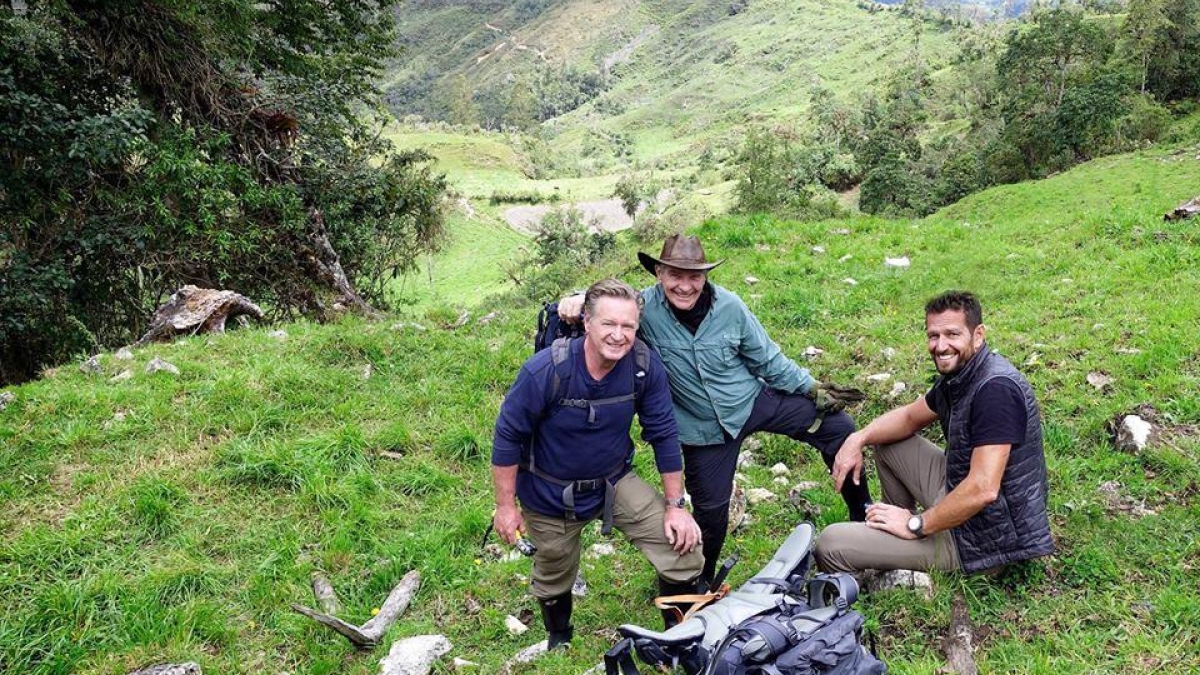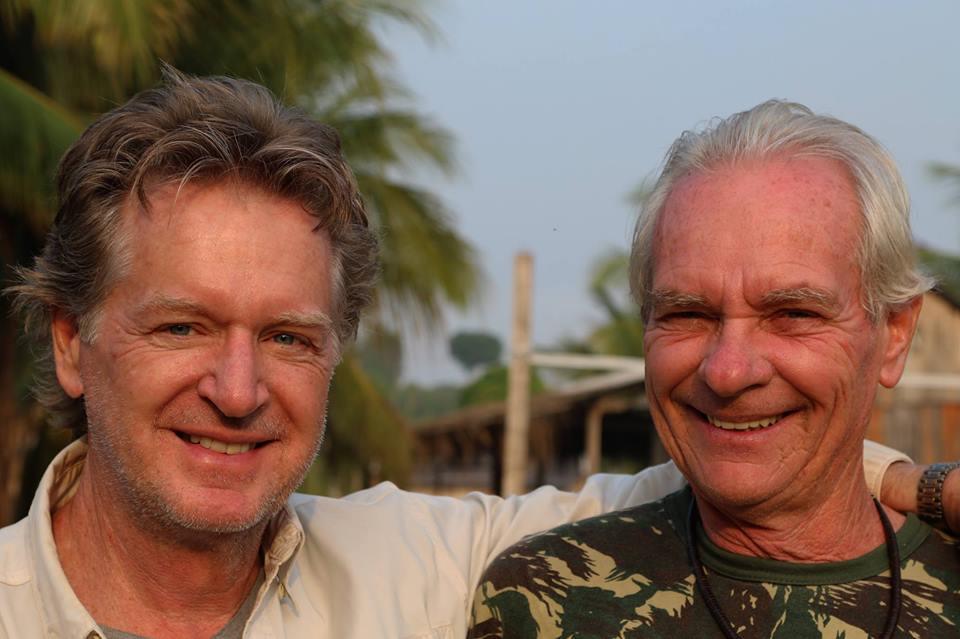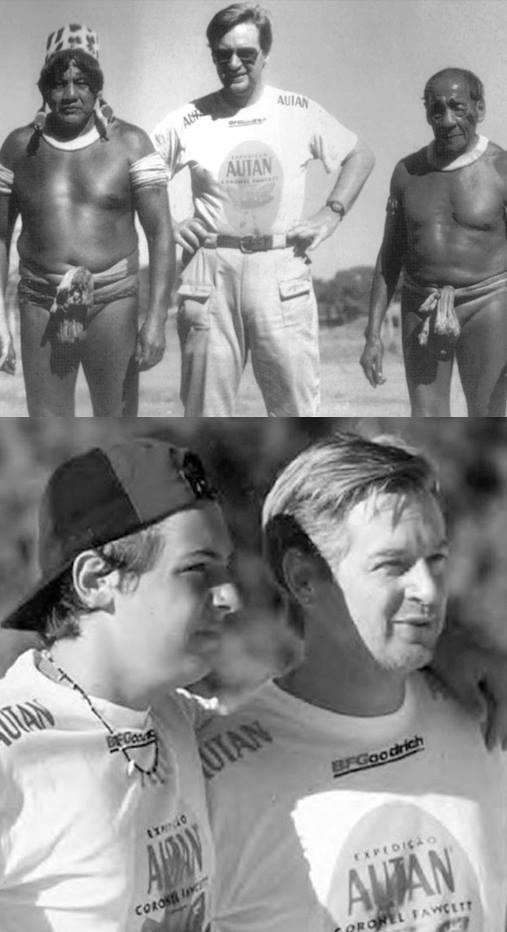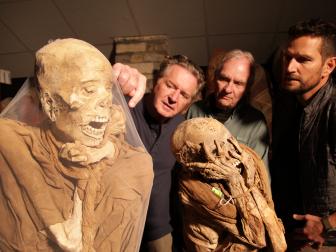Travel Channel follows Thunderbird alum to Peru's 'Land of the Giants'

There are few things that rattle American-Brazilian financier James Lynch.
He’s spent weeks living with Amazonian cannibals who he remembers as being “very nice and kind.” He came close to death on a trek deep into the jungle in search of the source of El Dorado Falls, one of the tallest waterfalls in Brazil.
He’s spent many nights lying on the open ground looking up at more stars than you can possibly imagine blanketing the night sky, cloaked in a cloud of warm damp air, listening to the orchestra of jungle sounds at night.
And once, when he was leading an expedition of 17 people, including his teenage son, in the Mato Grosso backlands of Brazil, the whole group was kidnapped and held hostage by a hostile tribe in the Amazon.
At 64, Lynch, who has pursued physically and mentally challenging adventures for 40 years, tends to take things in his stride these days. But he’s hardly slowing down. His most recent journey to Peru is the subject of a documentary on the Travel Channel, scheduled to premiere on Oct. 16.
Hidden treasures, lost legends
James Lynch, a 1977 graduate of Thunderbird School of Global Management, is the founding partner of Phoenix Strategic Financial Advisors. The name was inspired by his time at Thunderbird, but the company is based in Sao Paulo, Brazil, where he grew up. Lynch’s parents moved to Brazil in 1945, before he was born. They planned to stay three years, but fell in love with the country and stayed for 30.
Prior to launching his company, Lynch worked in senior investment banking positions for the Chase Manhattan Bank in New York and Latin America for 20 years.
During his time at Chase in Brazil, Lynch met René Delmotte, a Brazilian engineer. The two men were chosen out of a pool of 25,000 applicants to be part of the 1987 Camel Trophy challenge, a grueling 14-day, 2,252-kilometer road race in Range Rovers from the northern tip of Madagascar to the southern tip. The two have been adventure partners ever since.
James Lynch and René Delmotte after arriving home from time with cannibals.
Overlap between his work skills and explorations may be obvious: Both took a great degree of organization, the ability to inspire a team of people, persistence and negotiating skills. Yet the stakes can be very different during a project at work and an adventure in the jungle.
“I never had to negotiate for someone’s life at Chase,” Lynch said.
Lynch’s personal passion is pursuing adventures that combine physical challenges and exploration into lost worlds. His expeditions are all inspired by some historical question. His objectives are to decipher a mystery or myth. And the results often include lessons that he’s been able to use in all aspects of life.
Finding Fawcett
In the summer of 1996, when Lynch had to negotiate for the lives of his expedition team, including his 16-year-old son, James Jr., the group had set out in the jungles of Brazil in order to help solve one of the greatest exploration mysteries of the 20th century.
With the backing of Bayer, BF Goodrich and other corporate sponsors, Lynch and his crew set out to retrace the footsteps of Colonel Percy Harrison Fawcett, a British explorer who, in 1925, had disappeared in the forest along with his son and another companion. When they vanished, Fawcett’s party had been trying to uncover a lost civilization hidden in the Amazon.
For two months before setting out to solve the 71-year mystery, Lynch and Delmotte studied Fawcett’s records and satellite images of Brazil to plot their course. Their gear included turbo-charged Jeeps and 25-foot boats. Their team included a forensic anthropologist who could confirm the origins of objects they might find, including bones.
James Lynch and his son, James Lynch Jr., in 1996 with the Kuikuro tribe.
Deep into the jungle, along the Xingu River, Lynch and his crew found trouble. They were in a village of the Kuikuro people, one of the few tribes that still lived in the Amazon much as they had before the arrival of Europeans. They were surrounded by dozens of men from another tribe armed with bows and arrows and then loaded onto small boats.
“Where are you taking us?” Lynch asked.
“You are our prisoners for life,” one man responded in Portuguese.
Negotiation of a lifetime
After being held hostage in the jungle for three days, about 200 men appeared for a council. Lynch led the negotiations.
“Since my son was with us, that added a new level of adrenaline to the whole thing,” Lynch remembered.
Eventually, they agreed to a swap. The explorers would leave about $30,000 worth of gear in exchange for their freedom. Deal done? Not quite. They still needed to get out and get home.
Lynch’s team was given permission to have a small plane land on a nearby clearing, but the plane could only hold six people at a time. James Jr. was on the first flight out, which eased his dad’s mind.
Like many of Lynch’s stories, this one took several dangerous turns before it was over. He and another explorer had to stay one more night before the final flight out. And then when they returned to their starting point, they found that their vehicles had been stolen.
Negotiations began again.
Travel Channel: ‘Warriors of the Clouds’
The close call in Mato Grosso as they followed in Fawcett’s footstep (reassuring spoiler: they did get out safely) didn’t hold Lynch back from continuing to launch expeditions, looking for more adventures.
Photo courtesy of the Travel Channel
The most recent is his journey to Peru to find the not-so-mythical “Land of the Giants,” which became the subject of the Travel Channel documentary.
The program focuses on the Chachapoyas, the “Warriors of the Clouds”, a tribe of light-skinned, exceptionally tall Andean people who lived high in the forested mountains of the Amazonas region of present-day Peru, a place where civilization predates the Incas. All of the Chachapoya villages were above 10,000 feet altitude, very high in the jungle. Lynch said nearby villagers knew of rock ruins “on that mountain” and urged the explorers to go see it.
Of course, that’s easier said than done in the jungle, which grows over quickly, not to mention over hundreds or thousands of years. Lynch’s crew used a technology called LIDAR (Light Detection and Ranging) to map out the area. Using a large drone, they targeted LIDAR which essentially stripped out on the screen the jungle foliage to reveal massive rock ruins.
“We were looking at the printouts from the LIDAR and we found a structure that was very large and rectangular in shape,” Lynch said.
The explorers got their bearings from the LIDAR maps and headed out, cutting their way through the jungle toward what turned out to be the remains of a temple.
“We found what I believe to be a platform used to sacrifice people or animals. It was a flat platform with a 1,000-foot drop off. They wouldn’t have used that for anything else,” Lynch said. “The locals knew of the existence of this place, but nobody had really mapped it. Nobody had studied it.”
As fascinating as the platform and the surrounding area is, Lynch stops short from saying his crew “discovered” it.
“We didn’t discover it,” he stressed. “First of all it was populated by the people who built it and all the people who lived there, they know what’s up there.
“Even Hiram Bingham didn’t ‘discover’ the Inca citadel of Machu Picchu. All he did was listen to the locals who knew Machu Picchu was there and report on it to the outside world. We sort of did the same thing.”
Professional lessons from a life of adventure
The greatest lessons Lynch takes away from his adventures have not been found in artifacts or by walking through the former villages of ancient people. The lessons he takes with him every day come from talking to the direct descendants of those ancient people.
“Yes, I like the jungle,” Lynch explained. “The green does something for me. It recharges my batteries in an emotional way that I can’t explain. But what’s really fascinating to me is sitting down and talking to these people who live relatively isolated lives and who have had substantially different approaches to life than we have.”
"People may seem very different than you, but in the essentials, the basics, we are identical."
– James Lynch
In fact, one of the only things that rattles Lynch these days is coming across someone who assumes people who are different — especially natives living in isolated regions or the jungle — are ignorant or lack the knowledge required to make complex decisions.
“If we were left in the jungle for a week we’d be dead and they’ve been living there for a thousand years,” Lynch said.
It’s a lesson that every person in leadership can use every day.
“People may seem very different than you, but in the essentials, the basics, we are identical. We go through the same stages in life, from being born, becoming independent from our parents, finding mates and having children, growing old and dying. There are variations, of course, but we all go through a cycle very similar to this.”
Yet, we come up with different ways to cope with the problems and challenges that life presents and learn how to use our surroundings to our benefit.
Adventure-filled bucket list
Lynch says his life has been enriched immeasurably through this wonderful hobby. And he isn’t slowing down a bit.
“I have a rather long bucket list,” he said. “Places I want to go. Things I want to do. People I want to meet.”
And if the Travel Channel documentary is a success, Lynch, Delmotte and their film crew may develop many of those ideas into a series of adventure documentaries.
Top photo: Expedition leader James Lynch, navigator Rene Delmotte and field scientist Marsh Mokhtari journey deep into the mountain jungles of the Amazon for the Travel Channel.
More Business and entrepreneurship
The business behind the brand
Ask Jennifer Boonlorn ('01 BS in marketing) about the secret to a successful career in the luxury fashion industry and she'll tell you that community building is top of the list."I want to share…

Thunderbird at ASU ranked No. 1 in QS International Trade Rankings for third consecutive year
For the third consecutive year, Thunderbird School of Global Management at Arizona State University has been recognized as the world leader in international trade, a distinction awarded by…

'Meating' dietary needs: Study sheds light on how rising prices affect meat consumption
When prices on certain food items go up — like eggs and meat — because of the rise in plant-based diets, consumers can find an alternative.But our diets are also culturally conditioned, so for some,…


